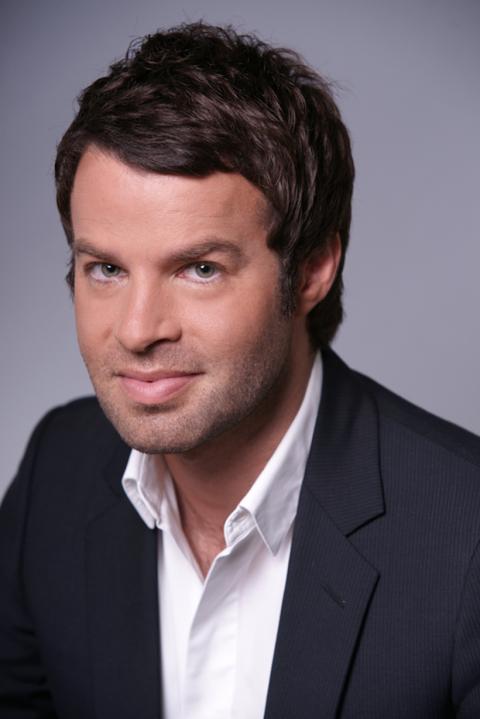La Vie Musicale

“I am known for making philosophical and funny comments, making strange music, and loving the girls.” — André Manoukian
Thomas Dorn
Multimedia Personality
It would be difficult to find anyone with a career comparable to that of André Manoukian ’79. A well-known celebrity in France, he’s renowned as a jazz pianist and composer, pop songwriter, record producer, and TV and radio personality. French youth know him for his role as a judge on the popular TV show Nouvelle Star (similar to American Idol).
Manoukian has just begun his 12th season with the show. “I am known for making philosophical and funny comments, making strange music, and loving the girls,” he says. “These are all parts of my personality that I can’t deny. I became somewhat of a personality that went over well with viewers.”
Manoukian has hosted various radio shows for France Inter, a major public radio channel broadcasting throughout France. One was a 10-minute radio spot on weekdays at 7:20 A.M. in which he critiqued new recordings of every musical style to a large drive-time audience. For two years, he hosted an hourlong show titled “On va tous y passer” in which he shared esoteric thoughts about music. “I would tell the story of music in my own way,” Manoukian says. “I love to mix science, history, spirituality, and more with music.” He did shows on Pythagoras and the harmonic series, 12th century monks making decisions about which harmonies the church could sanction, and a pair of American astrophysicists who perceived a buzz throughout the universe and concluded it was the sound of the big bang. “These are the kinds of stories I could tell on the radio that there isn’t time for on a TV show.”
Of Armenian heritage, Manoukian grew up in Lyon, France, playing the piano music of Liszt, Beethoven, and Chopin starting at six years old. At 14, he was transformed by a Fats Waller recording. “It was a shock for me after listening only to classical music,” he says. “I started learning his music by ear and noticing all his transition chords.” That fueled Manoukian’s quest for knowledge about jazz harmony. “I had seen some people playing jazz in a modern way, but none of them could explain what they were doing. I had read only classical music and I saw jazz players reading simple letters on a page and improvising so much music. But no one could tell me the rules.”
Following high school, Manoukian’s father encouraged him to study medicine. But after one term, it was clearly not a fit. His father, a tailor who had dreamt of becoming a doctor, was initially disappointed with his son’s choice to become a musician. Manoukian took a job demonstrating electronic organs and eventually saved enough money to come to Berklee in 1979. “Berklee was very important for me, he says. “In my first harmony class, I got so much information. It was so simple, but rich. For the first time, I began to understand how music worked.”
He returned to Lyon to process his newfound knowledge at the piano. Three days later, he was offered a spot touring with a French pop singer. But his musical career really lifted off during the 1980s, when he and trumpeter Pierre Drevet founded Horn Stuff, a popular funky jazz-fusion band with six horns. They gained acclaim releasing two albums and playing at European festivals. After signing with Virgin Records in 1987, Manoukian soared to even greater heights with singer Liane Foly. Their brand of jazz songs with French lyrics clicked and sold 2 million records. Manoukian wrote and produced music for other female singers, including African-English sensation Malia. In 1998, Manoukian and Drevet wrote arrangements and produced the album Jazznavour for legendary French-Armenian singer and songwriter Charles Aznavour. The outing featured Dianne Reeves, Michel Petrucciani, and other top jazz musicians.
In 2002, Manoukian was offered a spot as a judge on Nouvelle Star. On some episodes, the singers performed songs from his catalog. “I found the experience interesting,” he says. “The first time they did one of my tunes, it was like that moment when I heard Fats Waller. I started to feel that the voice is the best instrument in the world.”
Manoukian’s visibility has brought additional opportunities. In 2006, he composed music for a documentary on the Armenian diaspora, using traditional folk songs in his soundtrack for piano, bass, and drums. “Because of the show, doors opened at Blue Note France, and I released that music on my album Inkala.”
Manoukian performs 40 concerts yearly with his jazz quartet, including appearances at the CosmoJazz festival in Chamonix. In 2010, he established the festival, which takes place in the picturesque village nestled in the Alps of southeast France. The event draws jazz musicians and fans together in a spectacular environment. Later this year, Manoukian will produce renditions of his songs by four past finalists of Nouvelle Star as well as an instrumental recording that will blend his acoustic piano stylings with loops and electronic processing.
This past January, in recognition of his work in breaking down barriers between the public and culture, Manoukian received the insignia of l’Ordre des Arts et des Lettres from France’s minister of culture, making him a knight of arts and letters.
All these happenings have assuaged his father’s worries about his choice of a music career. “I am happy that he has gotten to see how things are going,” Manoukian says. “He’s proud now with what I’ve accomplished.”

“On September 11, I slept until 10:00, and I think I must have been the only one in New York who didn’t know what was happening.” —Alexis Jouffa
The Young Executive
“I applied to Berklee because I was such a fan of [producer] Quincy Jones and the records he made with Michael Jackson,” Alexis Jouffa ’01 recalls. “Legendary French record producer Eddie Barclay was a family friend and had worked with Quincy in Paris in the late 1950s. He recommended that I go to Berklee because Quincy went there.” Jouffa had studied finance for four years in Paris before leaving to study music production and to major in Music Business/Management. “Berklee had the top music business program in the U.S., and I knew I wanted to study business in the music and entertainment area,” Jouffa says.
Fast-forward 13 years from the time he earned his Berklee degree, and Jouffa is now the deputy managing director and head of operations for IDF1, the top-ranked regional digital terrestrial television channel in France. As well, he’s one of the youngest executives at any major French TV channel. IDF1 broadcasts popular family-oriented entertainment to the Île-de-France region and its 12 million people.
Prior moving back to Paris after Berklee, Jouffa completed an internship in New York City during a difficult time. “I got there on September 10, 2001, the day before the terrorist attacks,” he recalls. “I was a bit jetlagged after flying in from Paris and had an interview for an internship at Jive Records at 11:00 A.M. on September 11. I slept until 10:00, and I think I must have been the only one in New York who didn’t know what was happening. I couldn’t find a cab anywhere and decided to walk. When I got there, there was no one at the front door and when the woman who was to interview me arrived, she was crying. She told me that the twin towers had collapsed and that I should go home.”
As luck would have it, though, Jouffa ultimately accepted an offer at Epic Records/Sony Music a week later. He worked within the creative marketing/video team producing music videos for Michael Jackson (“Rock My World”), Jennifer Lopez, Shakira, and Ozzy Osbourne. “It was amazing, but it was a somewhat scary time to be in New York because everyone was very shocked. Several months later, I returned to Paris and set up a music production company that specialized in hip-hop and r&b called Jakiss Productions.” Jouffa opened his studio and began working with major labels (Warner, EMI, Sony, Universal) recording their artists and producing songs for them.
After a few years, Jouffa had the good fortune to cross paths with Jean-Luc Azoulay, a powerhouse in French music and television. Azoulay had cofounded AB Productions, a music production company in 1977 with Claude Berda and had produced multiplatinum artists Dorothée and Hélène Rollès, among others. In 1987, AB focused on television, and developed the hit youth TV show Club Dorothée that was number one for 10 years on the leading French TV channel, TF1. In 1999, Azoulay split off to form JLA Productions, now one of France’s largest TV production companies.
When Azoulay wanted to establish his own TV channel (IDF1) in 2007, he hired Jouffa to set it up. “Jean-Luc brought me into the TV world,” Jouffa says. “He was impressed by the combination of my entertainment background and the business skills that I acquired at Berklee, as well as by my entrepreneurial approach. He hired me to perform a variety of business development tasks to help launch IDF1. I began by handling legal affairs, marketing, hiring staff members, and setting up strategic partnerships. I was honored to be immediately appointed as an executive member of the board of directors that includes such high-profile French media figures as Marc Tessier—the former CEO of France Télévisions—and Michèle Cotta—the former CEO of Radio France 2. Working with this dream team, I had the opportunity to research, develop, and innovate around every business issue involved in setting up a new TV channel from the ground up.“
Jouffa later earned an executive MBA at ESCP Europe business school, and Azoulay promoted him to deputy general manager of the channel. Consequently, Jouffa is the number-one man at IDF1 and reports directly to Azoulay. “My responsibilities continue to be very broad,” he says. “I have the general management part, as I handle the finances, business affairs and institutional relations with the French authorities, as well as team management and business development.” But he also has a deep creative side. He crosses over from the corporate side to cowrite scripts with the host of one of IDF1’s popular daily shows, JJDA . “It’s a news show with a humorous twist,” he says. “I’m always reading the newspapers and various websites looking for material we can use.”
Although his job and family life keep him busy, Jouffa always carves out time for his guitar playing. He practices daily and studies with renowned French rock guitarist Marc Tobaly of the classic-rock-era group Variations. “I’m still very passionate about guitar and music production,” he says. “I work on the music I love best: rock and r&b from the golden years of the sixties and seventies. I feel very lucky to have the passion for music in my life.”

“As a French guy with a classical background, I’m returning to Debussy and Ravel, my writing reflects some impressionist colors.” — Vincent Bourgeyx.
Tales of Two Cities
Virtuosic pianist Vincent Bourgeyx ’97 grew up in Bordeaux, France, studying the classical piano repertoire for years. But after turning his attention to jazz and then studying at Berklee, Bourgeyx found his niche. With connections he made during his time at Berklee, Bourgeyx launched his career in New York, and moved to Paris five years later, where he continues to be an in-demand player and teacher.
“Bordeaux is a big city, but there was not much of a jazz scene and not many musicians to play with when I was growing up,” Bourgeyx says. “A friend who had gone to Berklee, bassist Olivier Gatto [’88], told me that if I wanted to study jazz, I needed to go to Berklee.” So after finishing high school, Bourgeyx applied to Berklee and received a scholarship. “I figured I’d just go for one year because I didn’t have enough money to stay for all four,” he says. But the plans changed when Bourgeyx became the first recipient of the Billboard Endowed Scholarship at Berklee, which provided the funds needed to finish his studies.
And Bourgeyx finished with a flourish, playing at the 1997 commencement concert where piano master Chick Corea was in the audience as a commencement honoree. That was just one of many opportunities Bourgeyx got to play as a Berklee student, including performances at the Monterey Jazz Festival in California and Koyo Conservatory in Japan. “For the Joe Viola tribute concert at Berklee in 1996,” Bourgeyx recalls, “[pianist] Fred Hersh was scheduled to play with [saxophonist] Jane Ira Bloom, but he was ill and couldn’t make it. Gary Burton asked me to take his place.” Bloom ended up hiring Bourgeyx when he relocated to New York after graduation in 1997. It was his first professional break, and he worked with Bloom’s band for five years.
Bourgeyx became a busy player in New York’s jazz scene. In addition to working with Bloom, he played with trombonist Al Grey, saxophonists Ravi Coltrane and Mark Turner, drummers Bobby Durham and Antonio Sanchez, and singers Claudia Acuña and Jane Monheit, to name just a few. As was the case for Alexis Jouffa, Bourgeyx was in New York during the 9/11 attacks. His gigs thinned out a bit, and by 2002 he decided he’d move to Paris.
At first it was an adjustment to join a new scene in Paris. “I knew it would not be the same as New York,” he says. “It took me a few years after leaving New York to get established here. But now things are really great. Life is more comfortable for me here, but when it comes to finding other musicians, there’s no place like New York.
“There used to be clubs in Paris where someone like James Moody would play for a whole week with French sidemen. But the days when American jazz legends came to Europe and worked with European sidemen are over. Most artists bring their own bands here now.”
According to Bourgeyx, the main jazz clubs in Paris primarily feature artists from the States. “Local musicians get to play those clubs when they have a CD release,” he says, “so there are not a lot of steady gigs in the city.” France and other European countries do, however, have numerous jazz festivals that run year-round, offering lots of gigs for European artists. “I am always traveling for gigs in different cities and to festivals around France, Germany, Italy, and elsewhere,” he says.
Bourgeyx is an active recording artist and has released four CDs as a leader for the Fresh Sound label of Spain. Describing his stylistic preferences, he says, “I like music that swings but is modern at the same time. As a French guy with a classical background, I’m returning to Debussy and Ravel, my writing reflects some impressionist colors.” He has played on many albums as a sideman, and on the hot July night when we met in Paris, he had just left a recording session with drummer Philippe Soirat.
Bourgeyx maintains a home in Bordeaux with his wife and daughter and an apartment 300 miles to the north in Paris where he spends part of each week. In addition to his own gigs and sideman work, he also teaches at the municipal conservatory in Paris’s sixth arrondissement, or district. “I teach a couple days a week,” he says. “I don’t take more than that so I can continue to play gigs.”
As for his future aspirations, Bourgeyx says, “I’d like to do more as a leader, and do more projects with players from America. I also have a dream of establishing my own school. Teaching is in my blood; my mother was a teacher. I would create something where the students could play all the time—like we used to at Berklee.”

“When they see me onstage sweating and on my knees, giving my all in every note, it's very different to them culturally-and they like it.” — Robin McKelle
Jacob Blickenstaff
Memphis Cookin’ in Paris
“The French have had a huge part in my career for sure,” says American vocalist Robin McKelle ’99. These days, she spends nearly half the year working out of Paris, playing throughout France and other European countries with her American band the Flytones. For the rest of each year, she operates out of her home base in Rochester, New York.
McKelle saw her career lift off in Europe in 2006 after the French label, O-Plus Records, licensed her debut album for release on the continent. The disc, Introducing Robin McKelle, is a retro big-band swing album produced by Los Angeles-based trumpeter and arranger Willie Murillo and released by her friend Joe Ross ’99 on his Cheap Lullaby label. The French connection resulted after a clamor for the album began in America—before the disc was even pressed.
“National Public Radio host Susan Stamberg loved the [advance copy of the] album and did a segment on it,” recalls McKelle. “After the interview aired, the album got 12,000 presales on Amazon. It created a buzz and a small label from France licensed it for Europe.” The label also connected McKelle with people who produced a promotional video to launch her performing career in Europe. Loop Productions, a French agency representing many top American jazz artists, booked McKelle at the Paris Jazz Festival with a jazz trio, after which a TV crew from the major French network TF1 did a piece on her. After that, her career gained traction.
“The French people have an infatuation with American singers,” McKelle says. “I was lucky, it was the right time for me; things blew up very quickly. I went from playing 100-seat clubs to a 1,200-seat theater in three months. Then I was booked for six weeks that summer at all of the jazz festivals in France and elsewhere.”
McKelle’s first album featured big-band swing and Latin treatments of standards such as “Night and Day,” “The Lamp Is Low,” and “Come Rain or Come Shine.” It was intended to be a demo to get her work singing with pops orchestras. “A conductor friend, Jeff Tyzek, started booking me with different pops orchestras in the States—including dates with the Boston Pops,” she recalls. “I enjoyed that and started thinking of how to further my career.”
With the momentum building in Europe after her debut album, she signed with Blue Note France for her 2008 album, Modern Antique, which mined a similar musical vein. “When I started having success with the jazz material, I was thrilled,” McKelle states. “Reviews started coming out hailing me as a new jazz singer, but I didn’t identify with being exclusively a jazz singer.” On her early recordings, her voice was crisp and clean. “I realized that what makes my voice unique is that I have a rasp to it,” she says. “I finally accepted that the Memphis sound with blues, country, and soul really suited my voice well. You begin to evolve when you accept all of what you really are.”
McKelle gradually transitioned to a different sound. “I didn’t want to lose my audience by making a quick shift,” she says. “I was working steadily in Europe and had a contract with Blue Note. I didn’t want to walk away from all that.” She mixed some soulful original songs with funky takes on tunes by the Beatles, Leonard Cohen, and others on her third album, Mess Around.
On her fourth record, Soul Flower, she fully revealed herself as a songwriter and singer doing r&b and soul music in collaboration with the Flytones. Her live shows started out with jazz numbers, then moved toward blues and soul songs. “My fans knew what was coming because I’d been foreshadowing it,” she says.
With her 2014 release, Heart of Memphis, McKelle dug deep into the roots of soul. She recorded in Memphis, the city that spawned Aretha Franklin, Isaac Hayes, B.B. King, and others. To get closer to the sound of the classic Stax recordings, McKelle and the Flytones recorded in Memphis with producer Scott Bomar and arranger Marc Franklin of the Bo-Keys, a band preserving their city’s musical legacy. The songs and McKelle’s performances have never sounded more soulful or authoritative.
McKelle says that French audiences feel authenticity in her music. “It is evident to an audience when an American band takes the stage,” she says. “It’s authentic, and they are drawn to that.” How she puts a song across also factors into the equation.
“I’ve always been very comfortable giving a lot onstage,” she says. “Singers like Tina Turner and James Brown put everything out there and made themselves vulnerable. That’s an [American] cultural thing too. The French people are not as open as Americans, they’re more private and to themselves. When they see me onstage sweating and on my knees, giving my all in every note, it’s very different to them culturally—and they like it.”
France and other European countries have embraced McKelle’s music, and London DJs have made remixes of her songs. The American market has been harder for McKelle to crack, but she’s hopeful. “The remixes could help in the U.S.,” she says. “A lot of people look to the British soul scene for what’s happening. It takes just one pop to open things up.”




